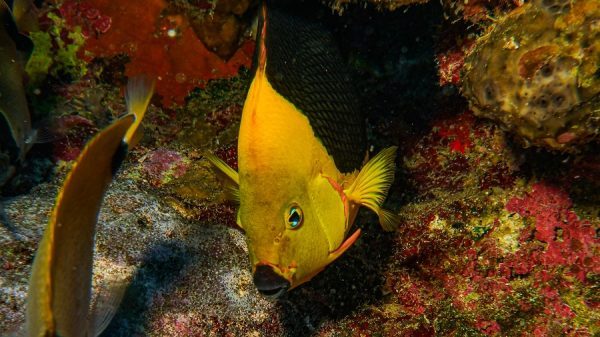
The newly released “Baseline Report on the Status of Marine Species” has findings on the status of coral reefs and the population of herbivorous fish, especially parrotfish, doctorfish, surgeonfish, angelfish, butterfly fish and sea cucumbers in the country. It is a follow up action to Decree 418-21 of 2 July 2021 that had prohibited the fishing of several marine species until 2023.
During the presentation, Environment Minister Orlando Jorge Mera explained that the report contains an investigation carried out by the Vice-Ministry of Coastal and Marine Resources, in nine coastal provinces. These are San Pedro de Macorís, San Cristóbal, Peravia, Azua, Barahona, Samaná, Puerto Plata, Monte Cristi and La Altagracia.
“This research seeks the preservation of herbivorous fish that play a fundamental role in marine health, cleaning the algae that take light and oxygen away from the coral reefs, a fundamental role in the ecological balance and their survival,” explained Jorge Mera.
Research findings
The study carried out by technicians of the Ministry of the Environment determined the presence of 4,563 fish of different species. 2,911 of the Scaridae family, which includes parrotfish, soapfish, butu, parrotfish; 1,512 Acanthuridae, belonging to doctorfish and surgeonfish; 5 Pomacanthidae, angelfish and 135 Chaetodontidae, butterfly fish.
The assessed areas show deterioration of many areas with the predominant presence of algae.
The species that contribute most to diversity by abundance, by province, are included in the Scaridae family, with 72.9% in San Pedro de Macorís, 63.01% in Peravia, 63.26% in Barahona and 66.21% in Azua.
However, for the province of San Cristóbal, doctor and surgeon species predominate with a diversity of 84.93%.
The species that contribute most to diversity due to their abundance in the provinces of the north coast with 80.75% are parrotfish, soapfish, butu, and parrotfish. In Montecristi they inhabit 63.01% and in Samaná 76.78%.
Meanwhile, for the province of Puerto Plata the values are similar in percentage for the two main families Scaride and doctor fish and surgeons with 47.2% and 50.43%, respectively.
The study indicated the fish population is declining due to overfishing of adult individuals, altering the delicate balance of coral ecosystems. That is to say that among the groups of fish evaluated, individuals of less than 10 cms, considered juveniles, predominate, reflecting a direct impact of the loss of pre-adult and adult individuals. In general, there are different percentages between the number of juveniles, with 60.77% and pre-adults/adults with 39.23% within each family.
“Some researchers suggest that small herbivores are less efficient at controlling large fleshy algae and produce a greater number of bites on corals, which may contribute to coral deterioration. Some studies indicate that, on degraded reefs, juvenile parrotfish may contribute to the consumption of algae, mainly turf algae, thereby helping to support the establishment of new coral recruits to the reef,” the study says.
Recommendations
The technicians of the Vice Ministry of Coastal and Marine Resources recommend fishery administration systems be created for the sustainable exploitation of aquatic resources.
Another recommendation is the development of joint inter-institutional plans for the application of sustainable closures that benefit the ecosystem and fishing stakeholders. Likewise, to promote and establish alternatives to reef fishing.
They also state that there is a need to support the state institutions responsible for the monitoring, control and enforcement of fishery and reef protection programs.
Another recommendation is to effectively promote the education of local fishermen and consumers to better understand why these species should be protected.
About Decree 418-21
On 2 July 2021, through Decree 418-21, President Luis Abinader prohibited for two years the capture, fishing and commercialization of several herbivorous reef species for the preservation of coral reefs, which are among the most biodiverse tropical ecosystems in the world.
Through the mandate, the Ministry of Environment was designated as the governing body of the environment, ecosystems and natural resources and was ordered to submit to the Executive Branch a report for a baseline on the current status of the species of the families Scaridae, Acanthuridae, Pomacanthidae and Chaetondontidae.
Read more in Spanish:
Ministry of Environment
24 February 2022

